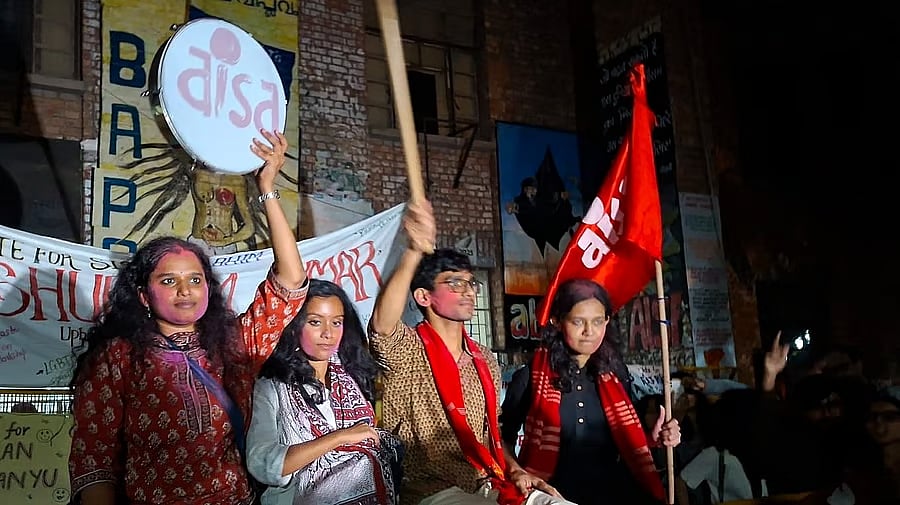Red Rules Once Again In JNU
The Left’s convincing victory can be attributed to the fact that it fought on a united platform, unlike in the previous election. The victory of the Left is also a win for JNU’s long-standing tradition of dissent and student activism.

The Left reclaimed its position in JNU | X/@cpimlliberation
The Jawaharlal Nehru University has just witnessed a red sweep with Left Unity, an alliance of the All India Students Association (AISA), Students Federation of India (SFI) and Democratic Students Federation (DSF), bagging all four central posts of president, vice president, general secretary, and joint secretary in the students’ union elections. Left Unity also bagged a majority of the councillors’ posts. The Left reclaimed its position in JNU, brushing aside the Akhil Bharatiya Vidyarthi Parishad, which had won one seat in the last election. The Left’s convincing victory can be attributed to the fact that it fought on a united platform, unlike in the previous election. The victory of the Left is also a win for JNU’s long-standing tradition of dissent and student activism. The presidential debate, a hallowed convention in JNU, this year too was marked by lively discussions on a variety of subjects, including student issues, the Gaza conflict, the revocation of Article 370 in Kashmir, the Ladakh imbroglio and the incarceration of Sonam Wangchuk. The election outcome is a setback to the BJP’s students’ outfit, ABVP, which had been banking on cracks in Left unity to secure a toehold in the student panel. The National Students’ Union of India (NSUI), the Congress students’ wing, also fared very poorly in a setback to the Grand Old Party. Student union elections are often a weathervane for the national mood, though JNU has a unique position in that it has always been a red bastion.
In the past nearly a decade, JNU, once known as the premier academic institution of India, has been wracked by controversy, such as the 2016 sedition row, when an event to protest the hanging of Parliament attack accused Afzal Guru turned ugly with anti-national slogans allegedly being raised. Many students, including then JNUSU president Kanhaiya Kumar, were arrested on sedition charges. This was when the ‘tukde tukde’ gang moniker surfaced and the university was dubbed with an anti-national tag. In 2020, protests over fee hikes resulted in violent clashes leading to the police being called into the campus. Film shows and food festivals have also been causes for conflict in JNU, as in recent years the ABVP has gained ground in the university, resulting in clashes between the left- and the right-wing students. Two prominent ministers in the Narendra Modi government, S Jaishankar and Nirmala Sitharaman, are JNU alumni. In the last decade or so, JNU’s decidedly left-of-the-centre ethos has been replaced with a section of the faculty subscribing to the saffron ideology. The culture of lively debate, discussion, and questioning of authority was being slowly replaced by the straitjacket of traditional teaching methods. It is to be hoped that with the Left sweep in the student union polls, JNU’s old spark will be reignited.
RECENT STORIES
-
-
-
-
-
